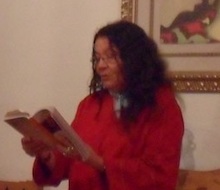Biography

Leslie Marmon Silko, an accomplished Native American writer, was born in Albuquerque, New Mexico in 1948. She has a mix of Laguna Pueblo, Mexican, and white ancestry. Silko grew up at the Pueblo of Laguna, located in west central New Mexico. She attended a Catholic school in Albuquerque, commuting from Laguna. In 1969 she received a bachelor’s degree in English from the University of New Mexico. She later taught creative writing and a course in oral tradition for the English department at the university.
Silko reveals that living in Laguna society as a mixed blood from a prominent family caused her a lot of pain. It meant being different from, and not fully accepted by either the full blooded Native Americans or white people. Silko, despite her pain, was able to overcome the lack of acceptance and identify with the Laguna culture. Despite her keen awareness of the equivocal position of mixed-bloods in Laguna society, she considers herself Laguna. As she puts it: “I am of mixed-breed ancestry, but what I know is Laguna” (Velie 106).
As a child Silko became familiar with the cultural folklore of the Laguna and Keres people through the stories passed down to her by her grandmother Lilly and her Aunt Susie. These women both had a tremendous effect on Silko, “passing down an entire culture by word of mouth” (Velie 106). While still in college Silko wrote and published a short story titled “The Man to Send Rain Clouds.” For this story she was awarded with the National Endowment for the Humanities Discovery Grant. In 1974 she published Laguna Woman, a book of poetry. In 1977 she wrote her novel Ceremony. The novel received high praise from critics and its readers. She has in fact been called the most accomplished Native American writer of her generation.
Silko’s additional literary works include Storyteller, Almanac of the Dead, and Yellow Woman + the Beauty of Spirit. She has also published several articles dealing with literature as well as other pertinent social issues. Examples of these articles include “In the Combat Zone” and “Race + Racism- Faces Against Freedom.”
Ceremony
Although all of her work has received exemplary reviews, Ceremony seems to be the most recognized for its literary achievement. There are a variety of positions taken by literary theorists and critics pertaining to the different themes in the book, and this can be an illustration of the many ways to look at Ceremony and its characters. Alan R. Velie, author of Four American Indian Literary Masters, says that Ceremony is not only an Indian narrative that “celebrates tradition,” but it belongs to another tradition and form older than the novel — the grail romance” (Velie 107). Velie compares the novel to twentieth-century novels that feature the legend of the Holy Grail in their fiction. He says that the similarity lies in the fact that there is a very serious connection between the health of the main character Tayo, and the health of his land. He argues that Tayo is the wounded king, Betonie the healer, and the Laguna reservation is the wasteland.
Another critic, Laura Coltelli, asked Silko in an interview if it was not the case that the story stressed the importance of women and their role in society. Silko answered by saying that the role of women in society was part of the theme but not all of it.
In her interviews and publications, Silko emphasizes the importance of stories to the Laguna Pueblo culture. In Critical Fictions: The Politics of Imaginative Writing, Silko writes that “the stories are always bringing us together, keeping this whole together, keeping this family together, keeping this clan together. ‘Don’t go away don’t isolate yourself because we’ve all had these kinds of experiences.’ And so there is this constant pulling together to resist the tendency to run or hide or separate oneself during a traumatic emotional experience. This separation not only endangers the group but the individual as well-one does not recover by oneself” (Silko 86).
Works Cited
- Coltelli, Laura. Winged Words: American Indian Writers Speak. Lincoln and London: University of Nebraska Press, 1990.
- Mariani, Philomena, ed. Critical Fictions: The Politics of Imaginative Writing. Seattle: Bay Press, 1991.
- Velie, Alan R. Four American Literary Masters. Norman: University of Oklahoma Press, 1982.
Selected Works
- Silko, Leslie Marmon. Almanac of the Dead. New York: Simon and Schuster, 1991.
- —. Ceremony. New York: Penguin, 1977.
- —. Gardens in the Dunes. New York: Simon and Schuster, 2000.
Related Sites
An interview with Leslie Marmon Silko: http://www.altx.com/interviews/silko.html
Author: Nafeesa T. Nichols, Fall 1997
Last edited: May 2017